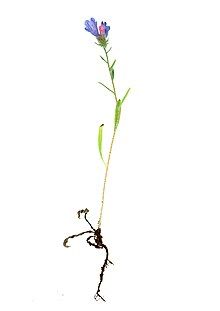Echium judaeum
| Judean viper's bugloss | |
|---|---|

| |
| Scientific classification | |
| Kingdom: | Plantae |
| Clade: | Tracheophytes |
| Clade: | Angiosperms |
| Clade: | Eudicots |
| Clade: | Asterids |
| Order: | Boraginales |
| Family: | Boraginaceae |
| Genus: | Echium |
| Species: | E. judaeum
|
| Binomial name | |
| Echium judaeum | |
| Synonyms[1] | |
| |
Echium judaeum, commonly known as the Judean viper's bugloss, is an annual plant endemic to southern Lebanon, southern Syria, Israel and Jordan, of the Boraginaceae family, and which, like other herbaceous flowering plants of the same genus, derives its name from the style's resemblance to the forked-tongue of a serpent during the flower's pistillate-stage of development.[2]
Description
[edit]The Echium judaeum grows to a height of about 50 cm, with funnel-shaped flowers that bloom between February and May. It is one of the few flowering plants where a lavender-coloured flower and a pink-coloured flower can be seen growing alongside each other from the same inflorescence. When revisiting the plant after a few days, the lavender-colour turns a deep purple, violet, or blue.[2] This discoloration of the flower is said to happen after pollination. The flower is bisexual, with petals measuring 25-32 mm in length.
The simple leaves and stems of the plant are completely covered with fine bristles that protrude from dark scales, and which makes touching unpleasant. In Arabic, the species of plant is known by the name Hyena's henna (Arabic: حنا الضبع, romanized: henna al-dhabaʿ).[3] In Modern Hebrew, the plant is called "the serpent of Judah" (Hebrew: עכנאי יהודה, romanized: ʿakhnai yehudah).
Habitat
[edit]The plant grows in shrub lands, but also appears in deserts. In Ottoman Palestine, the flower's pollen was harvested by honey bees in the production of honey.[4]
Further reading
[edit]- Lacaita, C.C. (1919). "A Revision of some Critical Species of Echium, as exemplified in the Linnean and other Herbaria; with a Description of Echium judæum, a new Species from Palestine". Botanical Journal of the Linnean Society. 44 (299): 363–438. doi:10.1111/j.1095-8339.1919.tb00707.x.
Gallery
[edit]
-
Lavender and pink floral arrangement
-
Echium judaeum in blossom
-
Judean viper's bugloss (Echium judaeum)
-
Pink blossoms of Echium judaeum
-
Israeli wild flowers
-
Pink florets of the Echium judaeum
-
Lavenders and pinks
-
Flowering plant standing erect
References
[edit]- ^ Hassler, Michael (1994). "World Plants. Synonymic Checklist and Distribution of the World Flora". Version 25.01; last update January 2nd, 2025. www.worldplants.de. Retrieved January 6, 2025.
- ^ a b Shmida, Avi (2005). MAPA's Dictionary of Plants and Flowers in Israel (in Hebrew). Tel-Aviv: MAPA Publishers. p. 335. OCLC 716569354., s.v. Echium judaeum
- ^ In other Arabic dialects, this species of plant is called لسان العسال (lisān al-ʻasāl).
- ^ Dalman, Gustaf (2013). Work and Customs in Palestine. Vol. I/2. Translated by Nadia Abdulhadi Sukhtian. Ramallah: Dar Al Nasher. p. 563. ISBN 9789950385-01-6. OCLC 1040774903.
External links
[edit]- Flora of Israel Online, by Prof. Avinoam Danin
 Media related to Echium judaeum at Wikimedia Commons
Media related to Echium judaeum at Wikimedia Commons








